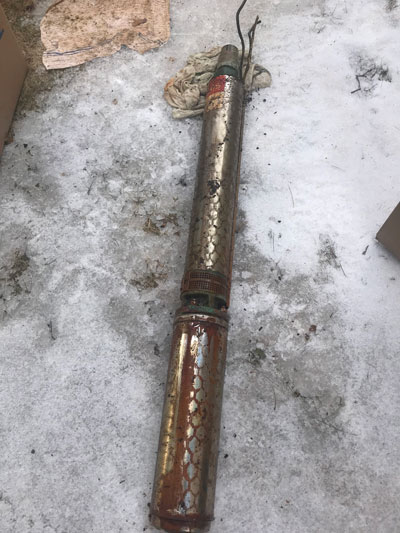In the heart of winter, crews in many northern states – Connecticut included – apply road salt to de-ice pavement. We’re not talking about a little bit, either. As the Association of State Drinking Water Administrators notes, more than 20 million tons of road salt are used on roads, sidewalks, parking lots, and other surfaces in the U.S. every year.
Effective as road salt can be in making winter travel safer and easier, it does have potentially negative consequences when it seeps into waterways, soil, and groundwater – which is of particular concern to well owners. At Greco & Haines, we can help you determine whether you may have road salt contamination in your well system and recommend a variety of effective solutions.
How Does Road Salt Affect the Water in Your House?
Road salt can enter into the soil and groundwater when it’s washed onto yards by runoff or sprayed into roadside ditches and banks. This can also happen when it’s incorporated into snow that’s plowed off of the road, where meltwater allows the salt to infiltrate underground water supplies. Of course, road salt may also enter surface water systems such as creeks, rivers, and lakes, but its impacts there are often less significant due to dilution.
The degree and rate at which salt percolates into the water table depend on several factors, including soil composition and texture, the geologic makeup of aquifers, and the local nature of groundwater movement. Depending on the groundwater flow rate, it may take years for road salt to reach a reservoir or well near the point of application. That being said, wells that are located near roadways or road salt storage sheds are most vulnerable to contamination.
High sodium levels in drinking water can increase the risk of excess dietary salt intake, which may lead to health issues such as hypertension. Additionally, chloride is commonly mixed into road salt to boost its de-icing performance at lower temperatures. Therefore, high chloride levels are also a possibility in wells exposed to road-salt infiltration. Besides affecting flavor, chloride in water can be a problem for house and garden plants and can also promote the leaching of metal plumbing equipment.
Research suggests that road salt contamination can be a significant issue for well owners. A 2018 study published in Environmental Science & Technology, for example, estimated that the substance impacted roughly a quarter of private wells in the state of New York.
From health risks to the increased corrosion of pipes, fixtures, and appliances, elevated sodium and chloride levels due to road salt can have a serious impact on your home and its inhabitants. Therefore, it’s an important issue to keep an eye out for and, if necessary, promptly address.
Monitoring Your Well and Drinking Water for Road Salt Contamination: Testing and Inspection Service from Greco & Haines
Looking to diagnose potential road salt contamination or prevent the problem from occurring in the first place? If so, Greco & Haines can help. We’ve been providing high-quality well water services in Connecticut since 1963, and our expert team has what it takes to remedy a variety of issues.
If you suspect road salt contamination in your system, reach out to us for the following well water services:
Water Quality Testing in CT
While it’s essential to have your well water tested once per year, suspected road salt contamination warrants additional evaluations. While bedrock geology and saltwater intrusion may be to blame for high salt levels in drinking water, repeated testing at different times of the year can often pinpoint road salt as the culprit – specifically if there’s a seasonal spike in sodium and chloride levels. We can also evaluate your water for the presence of lead, copper, and other metals that may derive from corrosion and leaching due to road salt-primed water.
If we find that your water supply isn’t up to par, we’ll recommend a top-quality water filtration system, such as one of our reverse osmosis or multimedia filters. These systems can help address road salt contamination by removing sodium and chloride from your drinking water.
Professional Well Inspections from Greco & Haines
Equally as essential as water testing is scheduling an annual well inspection from a professional technician. If your property is close to a road or salt shed, a thorough examination can determine whether problems such as an insufficient or compromised well casing are allowing salty groundwater to contaminate your supply. We can also help you identify structural or locational issues that may expose your well to road salt, such as an inadequate grade around the wellhead that encourages pooling.
Remedy Road Salt Issues with Help from the Experts at Greco & Haines
This winter, your well water may be affected by road salt that’s washed off of slushy highways and sidewalks. Therefore, it’s important to turn to a professional well water company in CT who can address any road salt-related issues. From comprehensive water testing to thorough well inspections, the Greco & Haines team can help you pinpoint problems and prevent well water contamination down the road. Plus, we offer service 365 days a year at no extra charge for weekend and holiday service!
For more information about our well water services, reach out to us today via our online contact form or call us any time at 203-735-9308, 203-777-2256, or from any CT area code at 1-800-922-2958.

